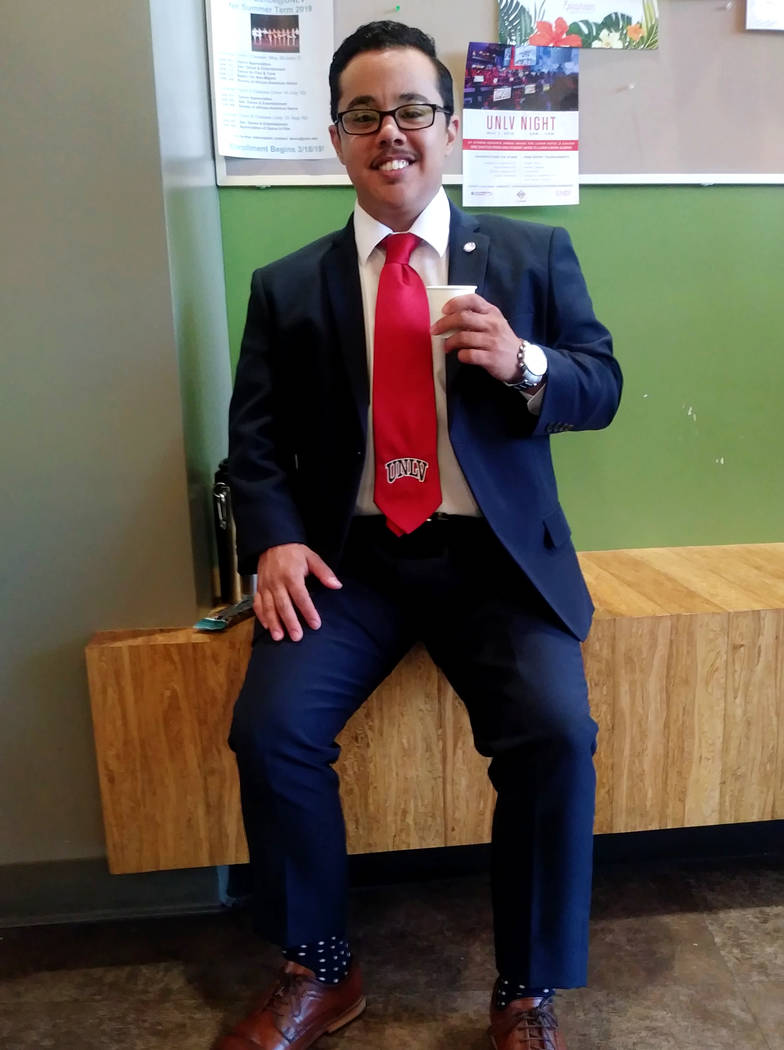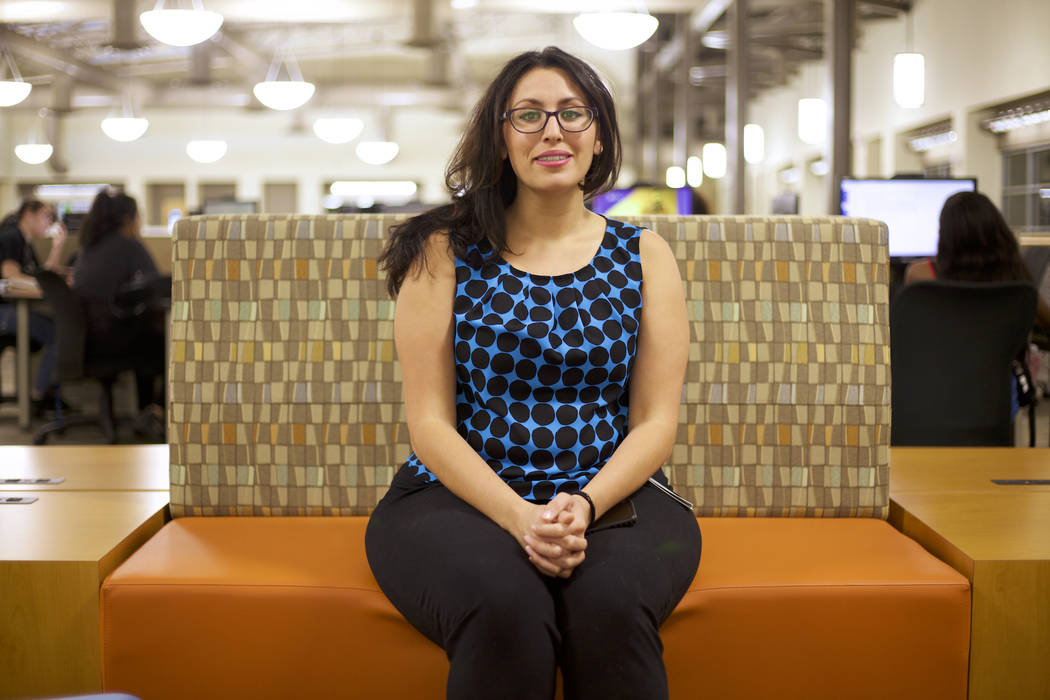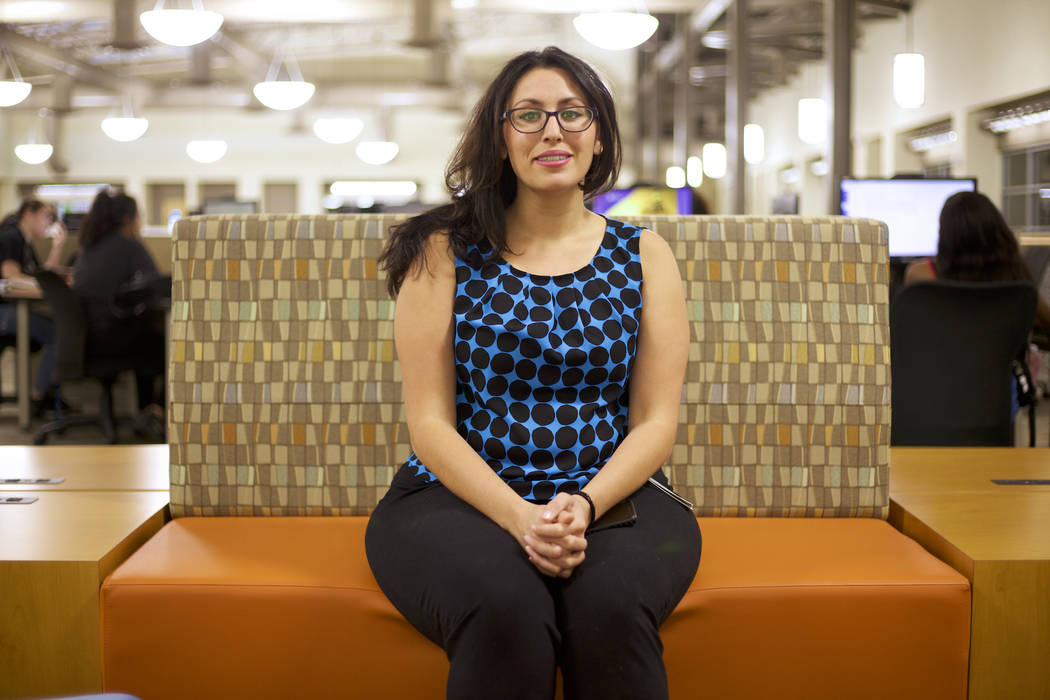Nevada college students get creative to graduate without loan debt
College of Southern Nevada grad Monique Moreno wasn’t afraid to put in the long hours she’d need to pay for college.
After all, she’d been working since she was 14 — first alongside her mom in CSN’s computer lab, then scooping ice cream at Baskin-Robbins, before eventually becoming a field technician in a casino on the Strip — juggling jobs in addition to her classes.
“I didn’t have a choice if I wanted to come to school,” Moreno, 26, said.
She started taking one or two classes per semester in 2010, paying the $284 price tag for each from her earnings at one of three jobs, along with a car payment and a $600 rent payment to start. After nearly nine years, including a break, she graduated from CSN in 2019 with two associate degrees and plans to go back for a bachelor’s.
Moreno said the time was worth it to avoid the kind of student debt that has left other young people struggling and led to calls from presidential candidates to forgive all, or a portion, of the $1.5 trillion estimated national total.
A changing Nevada
While Nevada’s average student debt from 2012-2017 remained low compared with the rest of the country, one 2018 survey based on data from The Institute for College Access found that the number of Nevadans graduating with loans during that time grew more than in any other state except for West Virginia.
Furthermore, from 2003-2018, the total statewide student debt increased tenfold — from $1.3 billion to $10.2 billion — while delinquency rates doubled from an already-high 7.79 percent to 14.27 percent, according to the Consumer Financial Protection Bureau.
Meanwhile, avoiding those loans is growing more difficult, as Nevada System for Higher Education tuition has risen more than 8o percent in 15 years while wages for young people have not kept up, according to a Guinn Center analysis from 2019. And the Silver State’s affordable housing crunch is particularly bad in its two university cities.
“Despite recent wage growth, expenses and income are not in alignment across Nevada,” the Guinn report said.
Put another way, a student in 1999 could earn a full year’s worth of tuition and fees at UNLV or UNR — about $2,000 — by working about 14 hours a week at minimum wage over the 13 weeks of summer.
In 2019, that student would have to work 62-hour weeks at minimum wage over the summer to pay for the $7,500 average yearly tuition, not taking into account the costs of room and board.
To avoid such a crushing load, more students like Moreno are determined to get through college without taking on loans. For this story, three Nevadans shared with the Review-Journal their approaches to graduating debt-free, and the challenges and limitations of each.
The part-time student
Moreno said her choice of career was influenced by her mom’s 20-plus-year career as a product manager working with computers, but she knew she couldn’t take the same path. While her mother had been able to advance via on-the-job training, employers today expect both work experience and a degree, Moreno said.
She said she hopes to find a job that will reimburse her as she pursues a bachelor’s degree in cybersecurity and then a master’s in a similar field. Though her goal is to avoid any student loans, she said she may not have a choice as she pursues upper-level degrees.
Moreno’s advice for students looking to avoid debt is to cut an education up into manageable pieces as she did and proceed just a few credits at a time. However, she admits her approach takes self-discipline, and may lead to less engagement with the campus. A study from the National Student Clearinghouse, for example, showed part-time students returned to college after their first year at a rate of 55 percent compared with their full-time peers, at 70 percent.
“I would love to be able to dedicate myself to school. I didn’t get as much out of it,” Moreno said. “But at the same time, I couldn’t go to school at all without money.”
In addition to more students seeking bachelor’s degrees, the number of graduate students has steadily grown since before the recession, with one study finding that more than half of all student debt is held by households with advanced degrees.
“As the payoffs to these credentials have grown, students likely have been more willing to bear higher costs to earn them,” the 2016 paper from the Wisconsin Center for Education Research states.
Sex work solution
Christina Parreira, a Ph.D. candidate at UNLV, was willing to shoulder the financial burden up to a point.
“I was drowning in debt for my master’s degree,” she said.
Parreira, who is studying gender and sex work, chose a more creative solution than a 9-to-5 job — one that ultimately led to research fodder for her doctoral degree. She turned to cam girl work.
Nevada is receptive to all types of sex work as a means of paying for school, Parreira said. Billboards for topless clubs in Las Vegas even appear to solicit students with debt, while UNLV was once ranked as a top school for sugar babies.
Parreira said she eventually went a step further and worked in a brothel as field work for her degree, adding that she would not have done so were it not part of her research.
She said both types of sex work were lucrative and figures she would have otherwise needed to find a job that might have conflicted with her classes or research.
Beyond the money, Parreira said working a few hours a week enabled her to avoid debt while pursuing other interests and career paths, including her most recent stint as the director of sex worker harm reduction at the Trac-B Needle Exchange.
Still, despite her positive experiences, Parreira said she wouldn’t necessarily recommend sex work to 18- and 19-year-old students.
“I’m hesitant to encourage anybody, though it is legitimate work,” she said. “I was not a teenager when I started. I knew the risks. You need to think about the ramifications long-term, because when you have a square job, these things will resurface.”
The G.I. Bill path
One option that’s often touted to students looking for help paying for college is to first join the military for the educational assistance offered by the G.I. Bill.
It’s what UNLV student Frankie Perez chose to do, and something he says was crucial to his development as a student.
“I would not have had the discipline to succeed in college straight out of high school,” Perez, 32, said. “The structure and discipline were good for me.”
But Perez, who’s transgender, said he’s conscious that the educational path he took is no longer open to younger trans people under President Donald Trump’s ban on transgender people serving in the military.
Perez said his time in the Air Force not only prepared him for college, but provided an affirming environment during his transition, as he was addressed by his last name and rank only. He had planned to return to the service after completing his education to become an officer and provide much-needed support and guidance for troops preparing for post-military life. Instead Perez said he’ll look to open his own therapy practice.
But even for students who can serve, the G.I. Bill has its limitations, Perez noted. For one, the monthly allowance for living expenses gets harder and harder to stretch every year as Las Vegas housing gets more expensive. The Guinn Center found that for every 100 low-income households, there are about 34 available rental units, and fewer than that for families who are considered very low income.
With $1,500 per month available for living expenses, Perez moved back in with his mother. He says the other options available, such as living with roommates, may not be realistic for veteran students, many of whom have families to support.
Perez is hoping to attend graduate school, and said that if he can’t find a program that will provide some financial aid, he may have to take out student loans after all.
“It’s worth it because education is one thing that can never be taken from you,” Perez said. “It’s a positive investment.”
Contact Aleksandra Appleton at aappleton@reviewjournal.com or 702-383-0218. Follow @aleksappleton on Twitter.
Related
Degree still valuable, debt or no, Nevada treasurer says


























